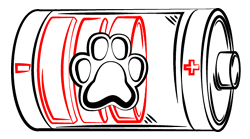
Paws ‘N’ Pups Quickview
Size
| Energy Level
| Trainability
| Paws ‘N’ Pups Rank
|
Characteristics
| Physical Characteristics: Height: 28-30” Weight: 65-130 lbs. Energy Level: Moderate – High | Colors: The Great Shepherd is found in the following colors:
|
Health & Longevity
Average Life Span: 8-13 years
Categorized as a giant crossbreed, the Great Shepherd is a mix of a German Shepherd and a Great Dane. Due to their large size, they have a few health issues that come from their parent breeds. However, usually these pups are healthy, and the health problems generally don’t make an appearance until around 5-6 years of age.
Development Issues
The biggest health concern for the Great Shepherd is the odd development of bones and joints, because of their large size. Some Great Shepherds simply grow too large too fast. Some development issues might include hip dysplasia, elbow dysplasia, spinal cord problems, and other skeletal diseases. Unfortunately, aside from surgical procedures, there is no way to cure a Great Shepherd with development issues. However, beginning as a puppy, take your canine for regular vet check-ups to ensure they are growing correctly and at a good rate.
Bone Cancer
Again, the Great Shepherd is so large in size that it can have a negative impact on their bones. Eventually, their bones might wear down due to everyday activities. As they age, this deterioration could result in arthritis, or worse, bone cancer. This aggressive disease is thus far incurable, but vets can work with you to make your pup as comfortable as possible.
Bloat
For many large dogs, this condition is severe, and it can be fatal if left untreated. Also known as the twisted stomach, bloat can cause a distended, swollen belly, breathing problems, a tear in the stomach lining, blockages to the heart’s blood flow, and a rapid, uneven heartbeat. If you suspect your Great Shepherd is experiencing bloat, get to the vet right away. Surgical intervention might be necessary to relieve the pressure inside your dog’s abdomen.
Other health issues that might affect your Great Shepherd are skin allergies, congenital heart defects, and glaucoma. These large dogs, despite their health problems, can live between 8-13 years.
Temperament & Train-ability
Great Shepherds are massive, so they require tons of room to run around, rest, and spread out. However, they make great family dogs, excellent watchdogs, and good night-time guard dogs. Their thunderous bark and generous size usually scares off any threat, such as intruders or predatory animals. These crossbreed pups are protective of their loved ones, as well as affectionate, but cautious, around strangers. They will allow you to pet them, but not without watching you from their peripheral vision.
The Great Shepherd is generally a relaxed, laidback dog indoors, but they are quick to run, play, and happily bark outdoors. They make friends quickly with other dogs, as long as those dogs are amiable and non-threatening.
These pups are oblivious to their size, so they might be unknowingly destructive when they’re playful. Walk your Great Shepherd at least twice a day and take him to a dog park occasionally for socialization with other big pups and friendly people.
Because of their big size, Great Shepherds consider themselves dominant over other dogs. You have to establish yourself as the dominant alpha of the pack, especially if you want him to take his training seriously. Train with firm, persistent commands, but keep your voice calm, strong, clear, and kind. Never, ever hit your Great Shepherd or use negative words to punish him for not picking up on your commands. Instead, be determined and consistent with your training. Early socialization and self-confidence will help you teach your Great Shepherd to be obedient.
Grooming
German Shepherds are known for their beautiful, long-haired coats. Great Danes have sleeker, shorter fur to comprise their coats. Your Great Shepherd could have one or the other, or a mixture of both. Either way, he needs to be brushed at least three times a week to cut down on pet dander and eliminate excess hair. Or, you could brush him once a day for extra bonding time and a softer, silkier coat.
You should also bathe your Great Shepherd whenever he gets dirty. Usually, once a month is enough. Use dog shampoo to leave his hair silky, smooth, and debris-free. Big dogs can wear down their nails naturally by running and playing, but if your Great Shepherd is letting them grow too long, trim or file them yourself at least once a month. Check his ears once a week to rule out any infections and keep them clean.
Diet
To keep your Great Shepherd healthy, happy, and energized, feed him 5 cups of dry kibble, divided into two meals per day. These meals should be high in protein, moderate in fat, and moderate in good carbs, like whole grains. The first ingredient in their dry dog food should be a lean meat, such as chicken, turkey, or lamb.
These big pups are notoriously sloppy eaters, so be sure to have a mat under his food bowl to catch any run-offs when he gobbles down his meals.
Looking for a Great Shepherd?
 Find A Great Shepherd Breeder |  Great Shepherd Puppies For Sale |  Adopt A Great Shepherd |
Cost
If you are buying your Great Shepherd puppy from a breeder, expect to shell out between $600-800. This often excludes vaccines, an initial vet visit, flea protection, toys, and food. So be sure you factor in all of the must-haves before making the decision to invest in this large crossbreed.
You can also check the local shelters. It is rare to find a Great Shepherd, but you might get lucky. Adoption fees could cost between $250-$400 because of their size, health requirements, and basic everyday needs.
Paws ‘N’ Pups Ranking
Paws ‘N’ Pups ranks every breed out of 4 with 1 being easiest to integrate into your life and 4 being the toughest – The lower the ranking the better.
Ranking takes into account a few basic factors including cost, skill level needed, high vs low maintenance and how critical regular training is to success. Integration-wise, the Great Shepherd ranks a 2.5. Their very large size makes it difficult to keep them in small spaces, like a starter home or an apartment. So you have to be established in a big enough home to accommodate a dog of this size. Otherwise, they’re sweet, loving, and protective. If trained properly, they would make a good family dog.
Breeds Similar To Great Shepherd
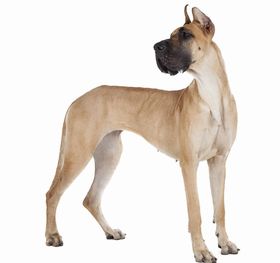 Great Dane | 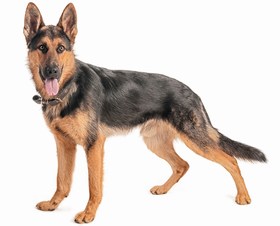 German Shepherd | 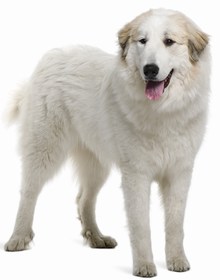 Great Pyrenees | 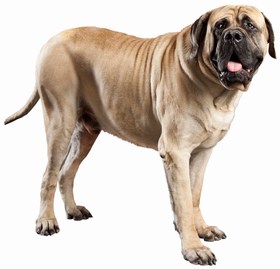 Mastiff |


